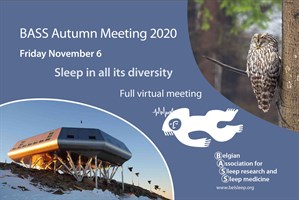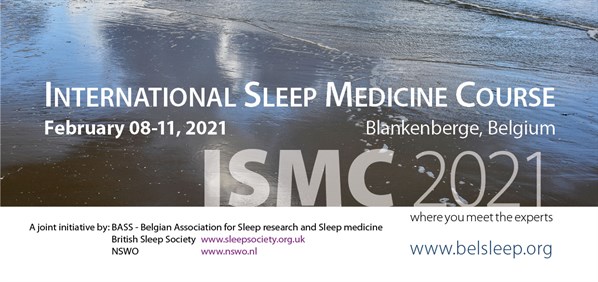Sleep Science Friday: A tour through Belgium with the BASS
Sleep Science Friday: A tour through Belgium with the BASS
26 February 2021
 Today’s SSF brings us to Belgium. The Belgian Association for Sleep Research and Sleep Medicine, or the BASS, is one of the oldest national sleep societies, founded as early as 1982, and is an active participant of the ESRS and ANSS events and initiatives. The logo of the BASS has been recognized as the best emblem among all national sleep societies by the ANSS. Today, the recently elected President of the BASS, Professor Dries Testelmans, Pulmonologist at the Department of Respiratory diseases at Leuven University Clinic will tell us about the milestones of the BASS in 2020 and plans for 2021.
Today’s SSF brings us to Belgium. The Belgian Association for Sleep Research and Sleep Medicine, or the BASS, is one of the oldest national sleep societies, founded as early as 1982, and is an active participant of the ESRS and ANSS events and initiatives. The logo of the BASS has been recognized as the best emblem among all national sleep societies by the ANSS. Today, the recently elected President of the BASS, Professor Dries Testelmans, Pulmonologist at the Department of Respiratory diseases at Leuven University Clinic will tell us about the milestones of the BASS in 2020 and plans for 2021.
 In defiance of all the challenges of the COVID-19 pandemic, the BASS had a successful 2020! It had it’s first full online, but highly attended meeting, and also held elections for the Board with a new BASS board with 8 members elected for the next 4 years (2020‐2024).
In defiance of all the challenges of the COVID-19 pandemic, the BASS had a successful 2020! It had it’s first full online, but highly attended meeting, and also held elections for the Board with a new BASS board with 8 members elected for the next 4 years (2020‐2024).
 The BASS has extended virtual activities to 2021, having just organized the joint Belgium-Dutch-British International Sleep Medicine Course (ISMC) online which is given in English, and provides comprehensive training in all aspects of sleep medicine, providing preparation for the ESRS exam.
The BASS has extended virtual activities to 2021, having just organized the joint Belgium-Dutch-British International Sleep Medicine Course (ISMC) online which is given in English, and provides comprehensive training in all aspects of sleep medicine, providing preparation for the ESRS exam.
More activities are highly anticipated, including traditional BASS meetings in June (planned as offline meeting in Leuven) and at the end of the year. The main focus of these meetings will be to shape the future organization of sleep medicine. Somnology is not recognized as a separate specialty in Belgium, and the BASS has already taken important steps for the development of a subspecialty in Sleep Medicine. In November 2018, the BASS, in cooperation with academic institutions, launched a proposal for this subtitle for internal medicine specialists, pediatricians, neurologists, psychiatrists, and pulmonologists. The application was also supported by the orofacial surgeons and dental specialists. The submission is still under review, but we’re hopeful for a positive decision. Another concern is the lack of national uniformity in sleep medicine. The BASS is developing a preparatory inter-university postgraduate course in somnology, which will bring closer the standardization of sleep medicine.
Finally, Prof. Testelmans gives a personal advice to sleep professionals and shares his personal experience on the use of digital technologies.
Our next stop will be in Antwerp, where the old (founded in 1979) Multidisciplinary Sleep Disorders Centre of Antwerp University Hospital and University of Antwerp has recently moved to a brand new building. Moving into a new Sleep lab is like moving to a new apartment – very exciting but also challenging. The medical coordinator of the Centre and pulmonologist Professor Johan Verbraecken, who is also the past-president of the BASS, will guide us through the new 21-bed sleep clinic (their multidisciplinary sleep team includes 43 medical professionals providing a wide range of diagnostic and treatment procedures including polysomnography, MSLT, actigraphy, sleep endoscopy, CPAP-titration, CBT etc.) and give you a hint for how to decide which medical innovations to implement and which ones to disregard.
Other publications by Prof. D. Testelmans et al.:
Deviaene et al. (2021) Capacitively-coupled ECG and respiration for the unobtrusive detection of sleep apnea. Physiol Meas.
De Wel et al. (2020) Respiratory decline in adult patients with Becker muscular dystrophy: A longitudinal study. Neuromuscul Disord.
Gilat et al. (2021) A critical review of the pharmacological treatment of REM sleep behavior disorder in adults: time for more and larger randomized placebo-controlled trials. J Neurol.
Schiza et al. (2020) Sleep Laboratories Reopening and COVID-19: A European Perspective. Eur Respir J.
Vandebotermet et al. (2020) Treating Central Sleep Apnea with One Modification. Ann Am Thorac Soc.
Lazazzera et al. (2020) Detection and Classification of Sleep Apnea and Hypopnea using PPG and SpO2 signals. IEEE Trans Biomed Eng.
Testelmans et al. (2021) Sleep-disordered breathing after lung transplantation: An observational cohort study. Am J Transplant.
Grote et al. (2020) Sleep apnoea management in Europe during the COVID-19 pandemic: data from the European Sleep Apnoea Database (ESADA). Eur Respir J.
Varon et al. (2020) A Comparative Study of ECG-derived Respiration in Ambulatory Monitoring using the Single-lead ECG. Sci Rep.
Deviaene et al. (2020) Multilevel Interval Coded Scoring to Assess the Cardiovascular Status of Sleep Apnea Patients Using Oxygen Saturation Markers. IEEE Trans Biomed Eng.
Recent publications from ESRS members:
Tarokh et al. (2021) Naps not as effective as a night of sleep at dissipating sleep pressure. J Sleep Res.
Liguori et al. (2021) Obstructive sleep apnea syndrome and Alzheimer’s disease pathology: may continuous positive airway pressure treatment delay cognitive deterioration? Sleep Breath.
Konkoly et al. (2021) Real-time dialogue between experimenters and dreamers during REM sleep. Curr Biol.
Markovic et al. (2021) Severe effects of the COVID-19 confinement on young children’s sleep: A longitudinal study identifying risk and protective factors. J Sleep Res.
Cesari et al. (2021) Inter-rater sleep stage scoring reliability between manual scoring from two European sleep centers and automatic scoring performed by the artificial intelligence-based Stanford-STAGES algorithm. J Clin Sleep Med.
Just published an article? Want your research to be featured? Saw something interesting? Contact us at ESRS
Deadline to apply for the 2021 Examination in Sleep Medicine is 28 February. The online application is already open on this website.
Not a member yet? Apply here and see our wide range of benefits, including a yearly online subscription to the Journal of Sleep Research, automatic membership to the Federation of European Neuroscience Societies (FENS), support for early career researchers via the ECRN, regular updates via the ESRS Newsletter, promotion of your research, and more.




